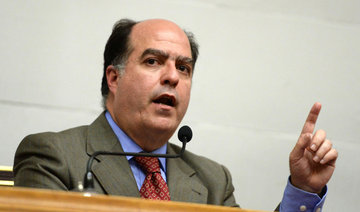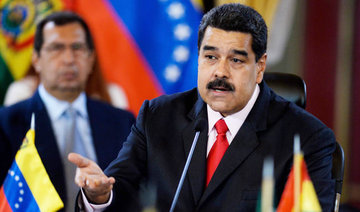CARACAS: Venezuelan President Nicolas Maduro has invited bondholders to unspecified “negotiations” over the country’s foreign debt in coming days, in response to recent US financial sanctions.
With Venezuela deep in recession and its currency reserves at their lowest in more than two decades, the Maduro government and state oil company PDVSA have to pay about $4 billion in debt and interest during the rest of 2017.
“All bondholders are invited to various rounds of negotiations over the next few weeks,” the president said in a speech late on Thursday to the new Constituent Assembly.
He reiterated Venezuela would keep honoring debt, but said he wanted to talk with bondholders affected by sanctions recently imposed by US President Donald Trump.
Maduro said Vice President Tareck El Aissami, already under US financial sanctions over drug trafficking allegations, and Finance Minister Ramon Lobo would coordinate talks and some “bilateral conversations” with bondholders had already begun.
In the same speech, Maduro said Venezuela would seek to “free” itself of the US dollar and “implement a new system of international payments” using currencies such as the yuan, yen, rupee, euro and ruble.
The president did not, however, specify whether paying in a different currency was an option his government wanted to discuss with bondholders.
The Washington-based Institute of International Finance, which represents large banks and financial institutions, said it was advising a group of holders of Venezuelan bonds.
“This informal group will take note of the Venezuelan announcements and discuss how to proceed,” IIF Executive Managing Director Hung Tran told Reuters. The group was made up of bondholders from the United States and elsewhere, he said.
Tran said Venezuela could not change the currency of bonds without agreement by all or a large majority of holders.
Last month, Trump, who brands Maduro a “dictator,” signed an executive order that prohibits Americans from dealing in new debt issued by the Venezuelan government or PDVSA.
That could complicate any debt refinancing attempts.
Washington has also sanctioned PDVSA’s finance boss Simon Zerpa, meaning US businesses are barred from dealing with him, and even Maduro himself in measures intended to punish the Venezuelan government for alleged corruption and rights abuses.
“I will be announcing Venezuela’s definitive response to the financial aggression we — and the international investors — have suffered from Donald Trump and (opposition leader) Julio Borges,” Maduro added in the speech on Thursday.
Borges, the head of the opposition-led congress whose role has been overridden by the Constituent Assembly, has been spearheading an opposition campaign for foreign financial institutions to put the squeeze on Venezuela’s government.
“Venezuela will take a position to defend the judicial and financial security of the republic and its investors or holders of financial instruments,” Maduro added.
BOND PRICES STABLE
Though Maduro gave no further details of what his government wanted to discuss with bondholders or where talks would be held, he did say 74 percent were American or Canadian.
Three bondholders consulted by Reuters said they had not received any formal approach to dialogue, though two said intermediaries for the government had been communicating with some investors informally.
“We didn’t receive an invitation or anything like that. Even if we had we don’t think we would take it too seriously,” said one portfolio manager at a large New York firm that owns Venezuelan debt, asking not to be named.
In trading on Friday, Venezuelan government and PDVSA bonds were little changed in price.
The OPEC nation of 30 million people is in the fourth year of a recession, with its population grappling with triple-digit inflation and shortages of food and medicine.
Critics say a long-failing socialist economic system is to blame for Venezuela’s financial troubles, while the government blames an alleged “economic war” by domestic foes and Washington.
International reserves stood at $9.873 billion on Wednesday, compared with nearly $30 billion five years ago, central bank data shows. They are at their lowest level since 1995.
Most of the country’s reserves are tied up in gold that cannot be used in financial transactions without going through a certification process in another country.
In another speech on Friday, Maduro said that Venezuela would begin selling its oil, gas, gold and “all products” in currencies other than the US dollar, but gave no further details of the intended changes in export transactions.



















